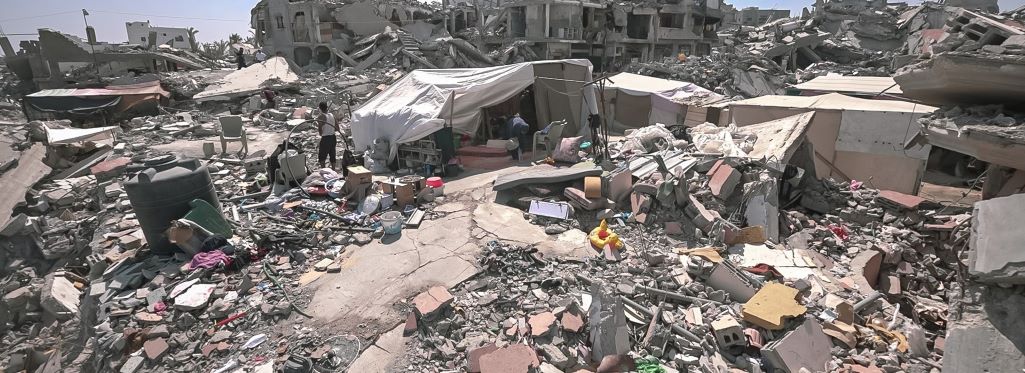Washington, DC., 2 October 2025—
In September 2020, the world witnessed what was hailed as a landmark moment for Middle Eastern diplomacy: the signing of the Abraham Accords. Brokered by the United States under the Trump administration, these agreements normalized relations between Israel and several Arab nations, including the United Arab Emirates and Bahrain, later joined by Morocco and Sudan. Optimists presented the accords as a pathway to peace, prosperity, and a new regional order founded on cooperation rather than conflict. But five years later, the region remains deeply unstable.
Since October 2023 and throughout 2025, Gaza has been the epicenter of what a UN Commission of Inquiry (COI) determined to be genocide. Once symbolic of potential peace, the Abraham Accords now cast a long shadow, representing not just a missed opportunity but a strategic shift that emboldened hardline policies and marginalized Palestinian voices to catastrophic effect.
Peace Without Palestine
One of the core criticisms of the Abraham Accords is that they bypassed the Palestinian question altogether. From the outset, critics warned that the accords were a peace between states, not peoples. Arab states that once conditioned normalization on a resolution to the Israeli-Palestinian conflict, as articulated in the 2002 Arab Peace Initiative, chose instead to establish ties without securing any concessions for Palestinians.
Palestinians were not included in the talks and view the deal not as a pathway to peace, but as a betrayal. They view it as a diplomatic circumvention that undermines their national aspirations of self-determination and isolates them further. It is important to acknowledge that self-determination is a right, and not a reward.
The Netanyahu government, on the other hand, celebrated normalization without needing to end the occupation, address the issue of settlements, displacement, lack of Palestinian political rights, or concede to the idea of a Palestinian state. The Abraham Accords simply papered over these foundational issues.
While the deals brought short-term economic benefits and security cooperation, they also redefined the regional calculus: Arab solidarity with Palestine was no longer a prerequisite for diplomatic relations with Israel. This de-prioritization of Palestinian rights sent a clear signal to Israeli leadership: normalization could proceed without peace. But without addressing the root causes of the Israeli-Palestinian conflict, no agreement can lead to sustainable peace.
The Catalyst to Genocide
Everything changed on 7 October 2023, when Hamas launched a deadly and unprecedented attack on southern Israel, killing over a thousand civilians and taking hostages. Israel launched a massive military campaign in Gaza, which has lasted more than 700 days and continues to inflict absolute horror upon Palestinians. At least 65,000 Palestinians are certain to be dead, of whom 75% are women and children.
However, we should start thinking that the number of dead is closer to 680,000. This is the number that analysts, scholars, and humanitarian professionals on the ground believe to be dead in Gaza. It will be hard to prove or disprove this number, as many hundreds of thousands are buried under rubble, but also because investigators are banned from entering the enclave and doing their work. But if this number is confirmed, it means that some 380,000 children, many under the age of five, have been killed.
Hospitals, schools, refugee camps, homes, shelters, mosques, and vital infrastructure continue to be destroyed. More than 90% of Gaza lies in ruins. The ongoing assault to take the last remnants of Gaza City will continue to endanger Palestinians, causing widespread destruction. A complete blockade of food, water, fuel, and medicine led to catastrophic humanitarian conditions. The constant bombardments have forcibly displaced 100% of the population multiple times.
Warnings Ignored
By early 2024, reports from the UN, TGR, Human Rights Watch, Amnesty International, and independent experts began using the word “genocide”. This was not hyperbole – it was grounded in the definitions outlined in the 1948 Genocide Convention.
“… acts committed with intent to destroy, in whole or in part, a national, ethnical, racial or religious group.”
Statements by Israeli officials, including high-ranking ministers, indicated intent, with rhetoric dehumanizing Palestinians as “human animals” and suggesting the complete erasure of Gaza. Mass displacement, starvation as a weapon of war, and the systematic targeting of civilian infrastructure became impossible to ignore.
And yet, the international response was tepid. The same governments that cheered the Abraham Accords stood paralyzed, or worse, complicit, as the situation spiraled into genocide.
Undermining Regional Stability
Rather than fostering genuine peace, the Abraham Accords have in many ways contributed to greater insecurity, emboldening Israel’s strategic posture and exacerbating tensions with Palestinians and neighboring countries. In the span of less than a year, Israel has aggressively attacked five of its neighbors (Iran, Lebanon, Syria, Yemen, and Qatar), in addition to the West Bank – Occupied Palestinian Territory (OPT), and Gaza. Israel increasingly acts with impunity, confident that its regional partnerships and unwavering US support will shield it from significant diplomatic consequences.
The Abraham Accords rewarded Israel with normalization without addressing the occupation or Palestinian statehood, reinforcing a belief that force could replace diplomacy. Increased arms deals, intelligence sharing, and diplomatic cover, especially from the US and EU, provided Israel with the tools and confidence to pursue maximalist military goals with minimal accountability.
Meanwhile, global institutions like the UN Security Council remained deadlocked. Western states undermined their own credibility by backing Israel unequivocally, while Global South nations decried the double standards. Palestinian leadership remained fractured, and their marginalization in regional diplomacy left their population vulnerable to being treated as collateral.
Genocide Witnessed in Real Time
What makes this tragedy particularly harrowing is its visibility. Unlike past genocides that unfolded in relative secrecy, the Gaza war has been livestreamed, documented in real time by journalists, citizens, and satellite images. Despite this, international inaction persisted, and calls for ceasefires were repeatedly vetoed or ignored.
In 2025, multiple international courts, most notably the International Court of Justice, began formal proceedings investigating whether Israel’s actions in Gaza constitute genocide. South Africa’s case at the ICJ has been a watershed moment, but accountability remains distant.
The Abraham Accords were never a true peace agreement. They were a geostrategic realignment that sidelined the core conflict at the heart of the Middle East: the Israeli occupation and dispossession of Palestinians. In bypassing justice, the accords laid the groundwork for what followed… genocide.
Five years after the signing of what was called a “historic peace,” the region stands not on the threshold of reconciliation, but in the aftermath of mass death and devastation. The lesson is brutal, but clear: there can be no lasting peace without justice, no security without dignity, and no diplomacy without accountability. As the world watches Gaza bleed, the promise of the Abraham Accords has turned to ash. History will judge not only those who committed these atrocities, but those who enabled them, excused them, or remained silent.
Photo Credit: Gaza War 2023 – 2025: IMG 8181 by Jaber Badwan. Licensed under CC BY SA 4.0
Lara Kajs is the founder and executive director of The Genocide Report, an educational nonprofit based in Washington, DC., advancing atrocity prevention and international law. She is the author of several field-based books that draw on extensive experience in conflict and displacement settings, including Yemen, Syria, and Afghanistan. Her writing and speaking focus on atrocity crimes, forced displacement, state violence, and international humanitarian law.

